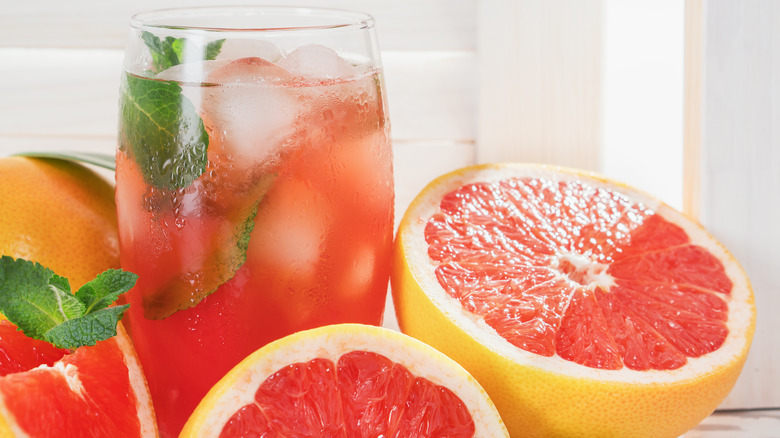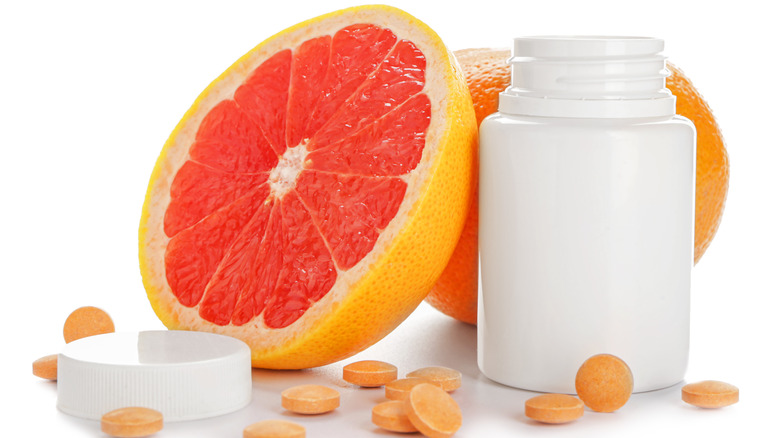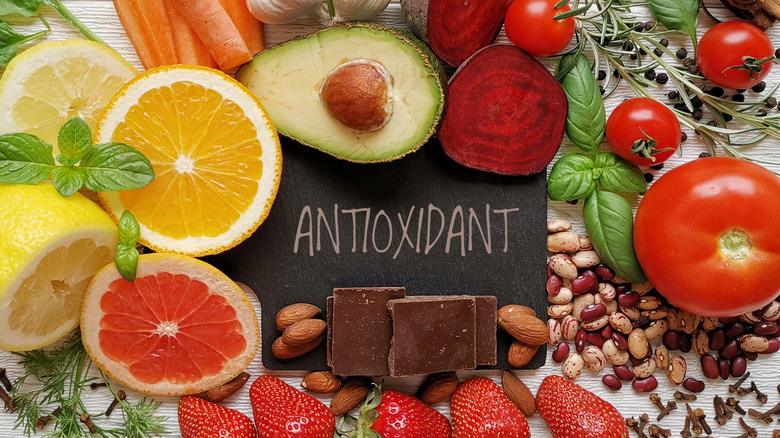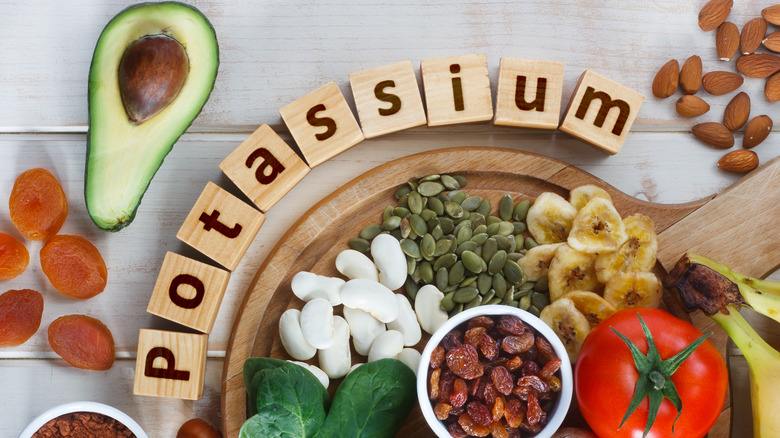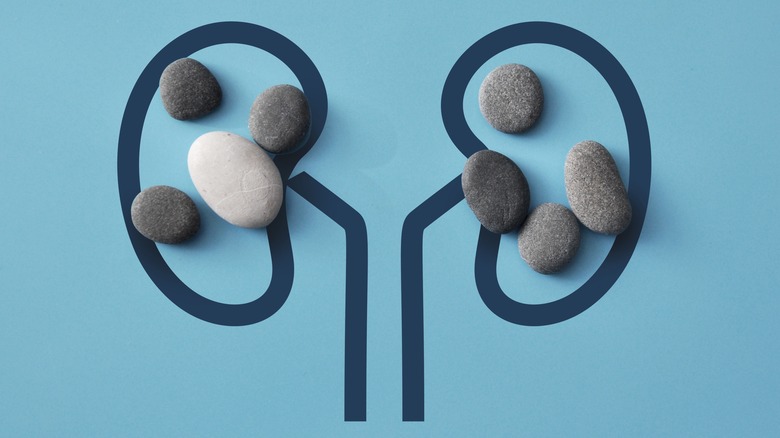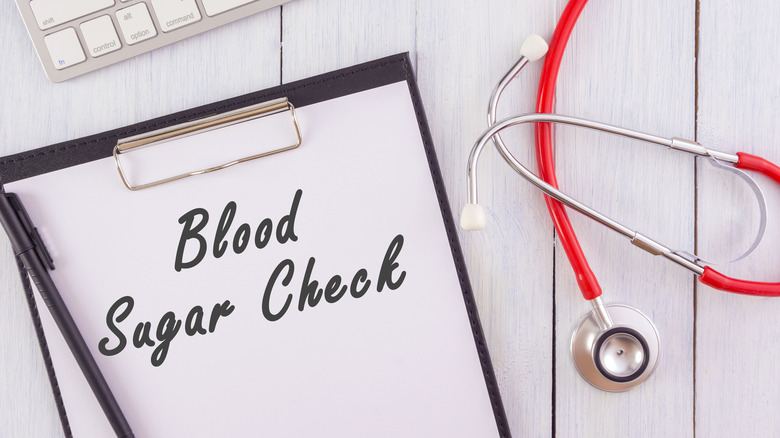When You Drink Grapefruit Juice Every Day, This Is What Happens
Grapefruits are juicy citrus fruits that come in multiple colors, ranging from pale yellow (also called white or blond grapefruits) to pink and bright red. Unlike other citrus fruits like oranges and lemons, grapefruits have a characteristically strong flavor that some describe as tart or sweet, but with a bitter aftertaste. However, their taste may change depending on the variety, as does their vitamin content (via LiveStrong).
Being highly nutritious fruits, grapefruits are touted as having numerous health benefits such as improved heart, skin, and immune health due to their high vitamin, mineral, and antioxidant content (via Medical News Today). Luckily, some of those benefits can also be reaped by drinking the juice.
While some enjoy eating the whole fruit, others prefer to drink its juice, which is a great addition to your breakfast or afternoon snack on a hot summer day. Just like orange juice, you could easily find grapefruit juice in your supermarket's juice aisle, or make it yourself at home by pressing grapefruit halves against a manual or electric juicer. You could even mix grapefruit varieties, or try a blend of grapefruit with orange, pear, or apple juice for an equally refreshing but naturally sweeter version. But should you drink grapefruit juice everyday? More importantly, what would happen to your body if you do that?
People taking certain medications may want to avoid grapefruit juice
Grapefruit juice can interact with some commonly consumed medications and over-the-counter drugs. According to the U.S Food and Drug Administration (FDA), grapefruit juice can alter how certain medications work by enhancing or hindering their effects. However, it all depends on your metabolism, the type of medicine you're consuming, and how much juice you drink.
When grapefruit juice enhances a drug, it means that it allows higher doses of the drug to enter your system. This happens because grapefruit juice blocks the activity of an enzyme called CYP3A4, which helps break down certain drugs. Thus, instead of being metabolized, the drug remains available in your bloodstream for longer. However, as with many things in life, more does not always equal better. If your body ends up with a higher dose than it can handle, you may experience more side effects, including tissue damage and organ failure. On the other hand, the juice can also keep certain medications from being absorbed, leading to a lower dose and preventing the drug from working correctly.
According to a 2013 study published in the Canadian Medical Association Journal, grapefruit can interact with more than 85 drugs, including certain antibiotics, cholesterol-lowering, blood pressure-lowering, anti-organ-transplant rejection, anti-anxiety, anti-cancer, pain-relieving, anti-inflammatory, and HIV drugs. Furthermore, the effects may last up to 3 days after drinking the juice (via Healthline). Thus, be sure to consult with your doctor about whether or not grapefruit juice affects your medication.
You will help strengthen your immune system
While vitamin C plays numerous roles in your body, the most popular one is probably its beneficial effect on your immune system. Grapefruit juice is an extraordinary source of vitamin C, according to a 2018 study published in the journal Voprosy Pitaniia. In fact, a glass of juice provides about 100% of the daily value (DV) for this vitamin — the recommended amount to consume per day.
Since vitamin C is an essential vitamin — meaning that your body can't produce it — you must get your daily dose from foods. Once ingested, it boosts your immune system via multiple pathways, per a 2017 study published in the journal Nutrients. For instance, it promotes the mobilization of white blood cells (your body's defense cells) to the site of infection to help fight harmful microorganisms, enhances microbial killing, helps avoid and treat respiratory infections, and supports your skin's barrier function against disease-causing organisms such as bacteria or viruses.
However, the study also states that vitamin C deficiency is the fourth leading nutrient deficiency in the United States, and that some people may either need to consume higher amounts or generally have lower levels of the vitamin in their system. Overall, people at risk of vitamin C deficiency include smokers, people who are fighting infections, are obese, or have type 2 diabetes, and athletes or people who exercise excessively.
You'll add valuable antioxidants to your diet
Antioxidants are highly praised compounds within the health and wellness world, but why are they so important? As registered dietitian Nicole Hopsecger explained to the Cleveland Clinic, "Antioxidants are naturally occurring chemicals in foods that can serve as a defense against free radicals ... which can damage the body's cells by changing a cell's DNA." In other words, antioxidants keep free radicals from harming healthy cells, which could ultimately lead to the development of various chronic diseases, including cancer.
Aside from containing vitamin C, a powerful antioxidant, grapefruit juice also packs several additional antioxidants such as flavonoids and beta carotene. Beta carotene is one of the primary plant-based sources of vitamin A in the human diet, along with other compounds known as provitamin A carotenoids — meaning that they play a role in the formation of this vitamin, according to the National Institutes of Health (NIH). It is also the pigment responsible for grapefruit's red and pink hue. Provitamin A carotenoids such as beta carotene in grapefruit juice have been linked to a reduced risk of several types of cancer, including lung, pancreatic, oral, and non-Hodgkin lymphoma. As for vitamin A, it is essential for eye health and offers a protective effect against age-related macular degeneration (AMD), the leading cause of vision loss in the elderly.
You'll be giving your muscle and nerve health a boost
Potassium is an essential mineral that your cells need to function properly. In fact, the National Institutes of Health (NIH) explains that it is present in every single tissue in your body because your body needs it to do pretty much everything. Among its multiple roles, potassium is in charge of managing muscle contraction and nerve transmission — the way your nerve cells communicate to get you to think, feel, or move. This process consists of your nerve cells sending electrical signals from one another to share the desired information. Since basic bodily functions such as breathing, heartbeat, and bowel movements rely on muscle contraction, potassium deficiency can lead to muscle weakness or paralysis, constipation, difficulty breathing, brain fog, and irregular heartbeat. However, potassium deficiency is rare among healthy people.
Luckily, potassium is widely available in a wide variety of foods, including fruits and fruit juices such as grapefruit juice. The recommended amount of potassium you should consume or not exceed each day — also known as the Daily Value (DV) — is 4,700 milligrams. A one-cup serving of grapefruit juice provides about 8.5% of the DV for this mineral, per the U.S. Department of Agriculture's (USDA) Food Data Central.
You could lower your risk for kidney stones
Kidney stones are literal stones that form in your kidneys when there's either not enough water or a build-up of minerals or metabolites (metabolism waste products) in your kidneys. Kidney stones are usually made out of four substances: calcium oxalate, uric acid, struvite, and cystine (via Healthline). One in 11 Americans may develop kidney stones, per a 2017 study published in the journal F1000 Research.
According to a 2021 review published in the journal Nutrients, the basics for kidney stone prevention include proper hydration, preventing an overload of oxalate and uric acid in the urine (two of the four substances that lead to stone formation), alkalinization of urine to avoid acidic urine, and promoting high urinary citrate levels. Fortunately, research suggests that since grapefruit juice is a citrus juice, it may help reduce the risk of kidney stones. The review explains that citrus juices aid hydration by promoting fluid intake, alkalinizing urine despite being acidic, and by being rich in citrate, the go-to inhibitor of stone formation.
Nevertheless, evidence on whether grapefruit juice lowers the risk of kidney stones seems to be mixed. The same review also notes that large studies found that grapefruit juice significantly increases the risk of stone formation, while smaller studies determined the opposite. It explains that one potential reason behind the increased risk is the high sugar content of the juice, which may actually raise calcium levels in urine, thus increasing the risk of stone formation.
Drinking grapefruit juice can help keep you hydrated
Your body is made up of about 50-70% water, a nutrient so important that your body depends on it to perform even the smallest task, including regulating your temperature, protecting joints and tissues, getting rid of waste products, and keeping essential bodily fluids in check — seeing that it is the main component of blood and saliva (via Healthline).
Since almost all bodily functions depend on water, water is constantly used and discarded throughout the day, primarily through sweat, urine, and even breathing. For this reason, you should make sure to replenish your water supply on a daily basis. Otherwise, you could end up dehydrated, a condition that can cause mild to serious health problems.
Yet, while you're probably familiar with the recommendation of drinking eight glasses of water per day to stay hydrated, experts say that you could also take advantage of water in foods to help you reach your daily water goals. According to the Mayo Clinic, "beverages such as milk, juice and herbal teas are composed mostly of water... can contribute to your daily water intake." Per the U.S. Department of Agriculture's (USDA) Food Data Central, grapefruit juice is composed of 90% water, meaning that drinking it daily can definitely contribute to your hydration goals.
How does grapefruit juice affect your blood sugar?
Managing your blood sugar levels is essential for people with diabetes or prediabetes, a chronic disease characterized by consistently high blood sugar levels affecting over 122 million Americans, according to the Centers for Disease Control and Prevention (CDC). To manage your blood sugar levels means keeping them within the recommended or target range to help you improve your energy levels and avoid serious diabetes complications, including kidney, vision, nerve, and heart problems (via the CDC).
While fruit juices are often ruled out of eligible diabetic-friendly beverages for being too high in naturally occurring sugars, grapefruit juice might prove otherwise. On the one hand, unsweetened grapefruit juice has a low glycemic index (GI). The GI of a food tells you how consuming it may affect your blood sugar levels, and foods and drinks with GI values under 55 are considered low because they lead to small changes in blood sugar. According to the University of Sydney GI Database, grapefruit juice has a GI of 49, meaning that it won't spike your blood sugar levels after you drink it.
On the other hand, per a 2014 study in mice published in Plos One, the major type of flavonoid antioxidants present in grapefruit juice, naringin, helped reduce blood sugar levels and improve insulin function in a way comparable to metformin, one of the go-to anti-diabetic drugs. Nevertheless, keep in mind that human research is still needed.
It may help lower your blood pressure
Grapefruit juice's blood-pressure-lowering effect is among the juice's multiple health benefits. According to a 2015 study published in The American Journal of Clinical Nutrition, an antioxidant called flavanone in the juice helped improve blood vessel elasticity in 48 healthy post-menopausal women, meaning that it reduced arterial stiffness. As Dr. Ananya Mandal explains via News Medical, "The stiffer and harder the blood vessel walls, the wider the pulse pressure and more the heart has to work to pump blood into the arteries." This means that arterial stiffness is a direct risk factor for high blood pressure, and drinking grapefruit juice seems to reduce the risk.
However, there's one big catch to consider: grapefruit juice can alter blood-pressure-lowering drugs by enhancing their effect, which could lead to dangerously low blood pressure levels. According to the Mayo Clinic, grapefruit juice interacts with a type of medication called calcium channel blockers, which are used to prevent or treat conditions such as blood vessel diseases, chest pain, and irregular heartbeat. Some popular calcium channel blocker drugs include amlodipine, diltiazem, felodipine, isradipine, nicardipine, nifedipine, nisoldipine, and verapamil. Therefore, talk to your healthcare provider before adding grapefruit juice to your diet if you are currently on medications to manage your blood pressure.
Drinking grapefruit juice may also help lower your cholesterol levels
Cholesterol is a fatty substance present in cell membranes that your body needs to produce certain vitamins and hormones, among many other functions. However, having too much cholesterol in your blood is a risk factor for heart disease (via Verywell Health).
Cholesterol can be divided into two main types. Low-density lipoprotein (LDL) cholesterol is known as "bad" cholesterol because, in excess, it can increase the risk of heart disease and stroke. On the contrary, high-density lipoprotein (HDL) cholesterol is referred to as "good" cholesterol because it helps remove excess cholesterol from your arteries, thus reducing the risk of heart disease. Another type of fat present in your blood is triglycerides. Though they're not a type of cholesterol, they also increase the risk of heart disease when present in high amounts.
Studies evaluating the effects of grapefruit juice on blood cholesterol levels are lacking. However, per a 2006 study in the Journal of Agricultural and Food Chemistry, people who ate one grapefruit per day registered lower triglycerides, total, and LDL cholesterol levels compared to the control group. Similarly, a clinical trial published in 2012 in Metabolism determined that consuming half a fresh grapefruit per meal for six weeks significantly decreased total and LDL cholesterol levels.
Nevertheless, this may be counterproductive if you're already taking cholesterol-lowering drugs, as grapefruit and its juice alter some commonly prescribed statin drugs used to lower cholesterol (including Zocor and Lipitor). Thus, you should consult with your doctor before drinking grapefruit juice.
Grapefruit juice could be rough on your teeth
Your teeth are covered by a hard substance that protects them from bacteria and acids from foods (via WebMD). This substance is known as tooth enamel, and when it gets damaged or worn, it increases your risk of dental cavities and sensitivity, a condition in which your teeth become excessively sensitive to extreme hot and cold temperatures. This can make many pleasurable everyday activities painful or unpleasant (think drinking coffee or eating popsicles).
Being a citrus juice, grapefruit juice is very acidic and rich in vitamin C. According to a paper published in 2020 by Karger Publishers, "vitamin C and frequent consumption of natural fruit juices and acidic snacks... are significantly associated with more erosive tooth wear." In fact, per Healthline, citrus fruits such as grapefruits — and therefore, their juice — are one of the worst foods for your teeth. However, you could still enjoy your grapefruit juice and take care of your teeth by drinking it through a reusable straw or washing your mouth afterward.
You could experience heartburn or acid reflux
According to the National Institutes of Health (NIH), gastroesophageal reflux disease, also known as GERD or chronic acid reflux, is a condition in which the acids from your stomach move back up to your esophagus. This causes its most common symptom: heartburn, an uncomfortable burning-like feeling in your chest affecting 20% of people in the United States.
One 2021 review published in the journal Annals of the National Institute of Hygiene explains that while there are non-modifiable risk factors for GERD such as age or genetics, there are lifestyle and dietary modifications that could help reduce the symptoms, which may help lower the risk of GERD-related complications such as esophageal cancer. The review lists orange and grapefruit juice (along with fatty, fried, spicy, and sour foods, alcohol, tomatoes, coffee, chocolate, tea, and carbonated drinks) as triggers for heartburn. Therefore, limiting their intake may be a simple way to avoid it.
Overall it's better to eat a whole grapefruit than to drink grapefruit juice
While sipping on grapefruit juice is a healthy, easy, and refreshing way to add more nutrients to your day, eating the whole fruit might be even more beneficial due to one particular nutrient that tends to be discarded when juicing a fruit: fiber.
Fiber is a type of carbohydrate that your body can't digest. However, it still manages to provide a wide range of health benefits, including improved gut health, lowering LDL cholesterol levels and heart disease risk, reducing the risk of certain types of cancers, stroke, and type 2 diabetes, and even aiding in successful aging, according to a 2018 review published in the journal Nutrients.
What's more, fiber provided by whole grapefruits may even help manage your weight. The review states that consuming whole fruits before or during a meal may help control your appetite because fiber increases your feelings of fullness, which leads to a reduced food intake. Therefore, don't stress too much if you find yourself with a whole grapefruit but without a juicer. After all, it provides the same benefits as the juice, plus a whole lot of fiber.

